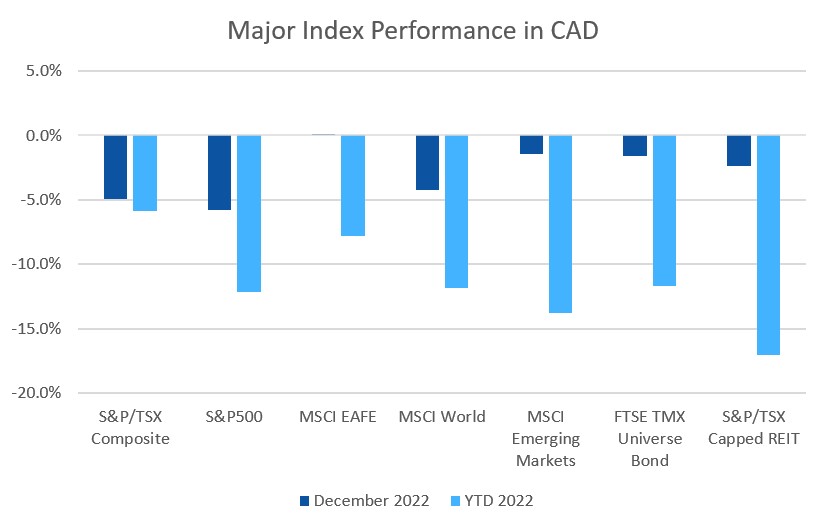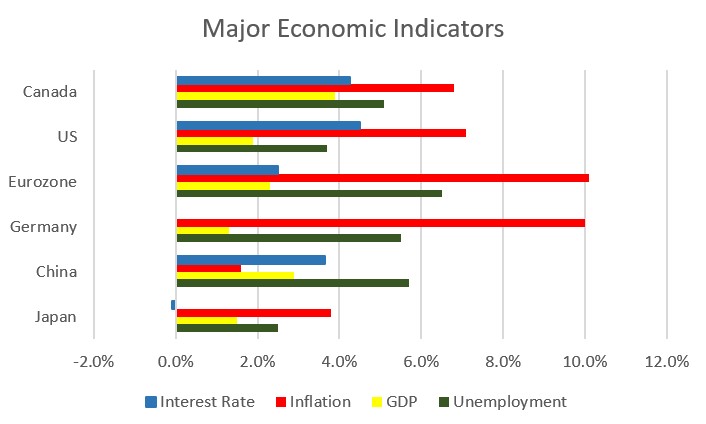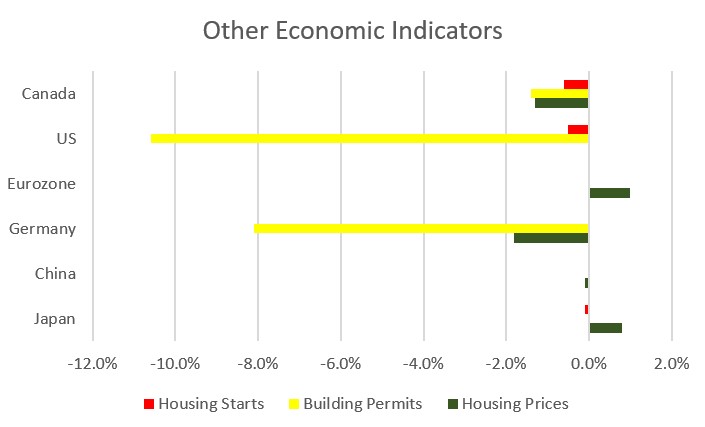Unfortunately December didn’t give us the Santa Claus rally that we were all hoping for, the markets were more of a Nightmare Before Christmas.
December 2022 Market Performance
All index returns are total return (includes reinvestment of dividends) and are in Canadian Dollars unless noted.
| Other Market Data | Month-end Value | Return for December 2022 | 2022 YTD Return |
|---|---|---|---|
| Oil Price (USD) | $80.47 | -0.11% | +6.99% |
| Gold Price (USD) | $1,826.20 | +4.16% | -0.13% |
| US 3 month T-bill | +4.42% | +0.05%* | +4.36%* |
| US 10 year Bond | +3.88% | +0.20%* | +2.36%* |
| USD/CAD FX rate | 1.3544 | +0.27% | +6.83% |
| EUR/CAD FX rate | 1.4458 | +3.33% | +0.47% |
| CBOE Volatility Index (VIX) | 21.67 | +5.30% | +25.84% |
*Absolute change in yield, not the return from holding the security.
Unfortunately December didn’t give us the Santa Claus rally that we were all hoping for, the markets were more of a Nightmare Before Christmas.
The main index of Canadian stocks, the S&P/TSX Composite, declined -4.9% in December and finished the year down -5.8%, its first negative year since 2018. The S&P/TSX Small Cap was down -2.1% for the month and -11.2% for 2022. US markets were worse off: the large cap S&P500 lost -5.8% (in USD) in December and -18.1% for 2022. The index of US small cap stocks, the Russell 2000 lost -6.6% (-21.6% for 2022), and the tech focused Nasdaq lost -8.7% in December and -33.1% for 2022. Fortunately the ModernAdvisor Core and SRI portfolios have a larger weight in Canadian than in US stocks.
The broad index of EAFE (Europe, Australasia & Far East) lost -3.1% in December, and -9.5% for 2022. Out of the EAFE regions, European stocks performed a little worse for 2022, losing -10.9%. Despite all of the turmoil in the UK following Brexit and turnover in the prime minster’s office, British stocks weathered 2022 very well, and were one of the only markets up for the year at +0.9%. Japanese stocks lost -6.7% in December and -9.4% in 2022; and emerging market stocks lost -18% for 2022.
Bonds also performed poorly in December, with both investment grade and high yield posting negative returns in December and for 2022 as a whole.
The major Canadian bond index, the FTSE/TMX Universe Bond Index lost -1.6% for December and -11.7% for 2022, its worst year going back to the start of the data we have for the index. Since 1994, that index had only had one year with more than 6 negative months; in 2022 it had 10! The bond index had also never had a drawdown that lasted more than 6 months; the current drawdown is now at 21 months and counting. The FTSE/TMX Short-term Bond Index lost -0.1% in December and -4.0% in 2022. The stats for the Short-term index were equally bleak. In the US, investment grade and high yield bonds were both negative. The investment grade ICE BoA AAA index lost -1.1% in December and -18.0% in 2022. High yield bonds lost -0.8% in December for the HY Master II Index, while the CCC and lower (the real junky stuff) Index lost -0.7% for the month. For 2022 those indexes were down -10.5% and -15.8% respectively.
Canadian REITs lost -2.4% in December, and -17.0% for 2022.
Oil was flat in December, hovering around US$80 per barrel. Gold gained +4.2% for the month, and was flat for 2022. The diversified Bloomberg Commodities Index lost -2.8%, for 2022 it gained +13.8%, and it was the only index we track that finished 2022 up more than 10%.
The Canadian Dollar (CAD) lost -0.3% against the US Dollar in December and -6.8% for 2022. Against the Euro, CAD lost +3.3% in December and -0.5% for 2022.
December 2022 Economic Indicator Recap
Below are the readings released in December for the major economic indicators: central bank interest rates, inflation, GDP and unemployment.
Below are the current readings on the housing market.
A Closer Look at the Canadian Economy
The Canadian labour market remains tight with many businesses seeing difficulty attracting interest in their open positions. Canada’s unemployment rate declined slightly to 5.1% in November with the number of unemployed persons falling by 23,800. The economy added 10,100 jobs; 50,700 full time jobs were added while 40,600 part time jobs were lost. At the sector level, gains were seen in financial services, real estate, and manufacturing.
Higher interest rates are having an effect on housing prices across Canada; the Teranet index posted its 5th negative month in a row. 8 of 11 major markets posted declines, the largest declines were in Montreal (-2.2%), Hamilton (-1.9%), and Vancouver (-1.5%). The only gainers were Halifax (+1.6%), Victoria (+0.9%) and Edmonton (+0.3%). The annual national price gain for the 12 months ended November 30 was +2.0%.
The level of new housing starts declined slightly in November to 264,000, with urban multifamily housing (condos and townhouses) accounting for most of that (190,000). The value of building permits issued declined -1.4% in October. Residential construction declined -6.4% led by declines in Ontario and Nova Scotia. Non-residential construction 9.5% with both commercial and industrial sectors posting gains.
The inflation rate for November was +0.1%, and +6.8% on an annual basis; inflation could decline by 2% and still be higher than inflation at any point in the last 25 years. Transportation costs rose at a slower pace as gasoline prices eased slightly in Alberta and BC. Housing costs also continued to rise as interest rate hikes by the Bank of Canada drove up mortgage costs, while rent increases also continued. Meanwhile, food price increases remained above 10%. Core inflation which excludes more variable items such as gasoline, natural gas, fruit & vegetables and mortgage interest was +5.8%. While the Bank of Canada has raised interest rates 7 times so far in 2022, it generally takes at least 12 months for interest rate increases to affect the economy – so don’t expect any major relief in inflation until well into 2023.
Canada’s GDP was up +0.1% in October (the same slight growth for 6 months in a row). This time the services sectors led the way, as they gained +0.3%, while the goods producing sectors declined -0.7%.
The Bank of Canada raised interest rates by 0.50% again at the December 7 meeting. The benchmark rate now sits at 4.25%, the highest level since 2008. With the labour market remaining tight and inflation remaining high, the BoC is expected to raise interest rates again at the January 25th meeting.
*Sources: MSCI, FTSE, Morningstar Direct, Trading Economics



